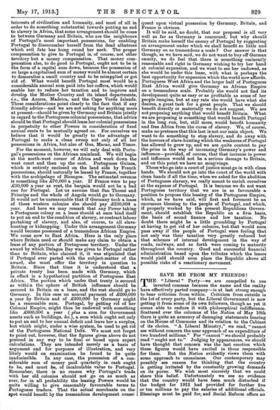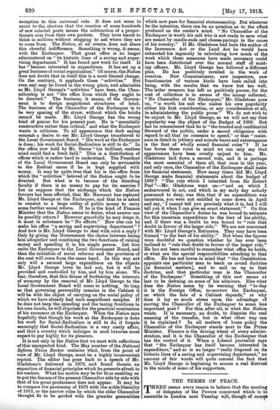SAVE ME FROM MY FRIENDS !
T"" Liberal " Party—we are compelled to use inverted commas because the name and the reality have effectively parted company—is at last strong enough to bear criticism from within. Criticism from outside is the lot of every party, but the Liberal Government is now getting it from some of its own followers, though as yet it seems able to endure it with philosophical indifference. Scattered over the columns of the Nation of May 10th there is quite an armoury of damaging statements bearing on the House of Commons and its relation to the Cabinet of its choice. "A Liberal Ministry," we read, "cannot see without concern the near approach of an expenditure of two hundred millions." For " cannot " we should probably read " ought not to." Judging by appearances, we should have thought that concern was the last emotion which these figures would have excited in those responsible for them. But the Nation evidently views them with some approach to uneasiness. Our contemporary may possibly see reason for thinking that the country is getting irritated by the constantly growing demands on its purse. We wish most sincerely that we could share this belief. Unfortunately we see no evidence that the country would have been much disturbed if the budget for 1913 had provided for further five or ten millions to pay the salaries of additional officials. Blessings must be paid for, and Social Reform offers no exception to this universal rule. It does not seem to occur to the electors that the creation of some hundreds of new salaried posts means the subtraction of a propor- tionate sum from their own pockets. They have learnt to think in millions without stopping to ask where they are to come from. The Nation, at all events, does not share this cheerful indifference. Something is wrong, it seems, with the Exchequer. That great office is no longer administered on " its historic lines of a saving and super- vising department." It has found new work for itself. It has " become interested in expenditure. It has set up a great business of social organization." Of course, the Nation does not doubt that in itself this is a most blessed change. On the contrary, it applauds these " activities." But even zeal may be found in the wrong place, and admirable as Mr. Lloyd George's " activities " have been, the Chan- cellorship is not " the office from which they ought to be directed." The business, it seems, of the Govern- ment is to design magnificent structures of brick. The business of the Chancellor of the Exchequer is to be very sparing of the straw, without which the bricks cannot be made. Mr. Lloyd George has the wrong kind of genius for his present post. He is "essentially constructive rather than critical," and what the Exchequer wants is criticism. To all appearance this dark saying conceals a desire to see Mr. Lloyd George transferred to the Local Government Board. " His work at the Exchequer is done ; his work for Social-Radicalism is still to do." In the office now held by Mr. Burns " his brilliant, restless mind could find a fresh field." This is a distribution of offices which is rather hard to understand. The President of the Local Government Board can only be serviceable to the Radical cause if he is kept supplied with money. It may be quite true that his is the office from which the " activities " beloved of the Nation ought to be directed. But what is to become of the directing faculty if there is no money to pay for its exercise ? Let us suppose that the exchange which the Nation favours has been effected, that Mr. Harcourt has replaced Mr. Lloyd George at the Exchequer, and that he is asked to consent to a large outlay of public money to carry some further social reform. If he is the kind of Finance Minister that the Nation seems to desire, what answer can he possibly return ? However gracefully he may drape it, it must in substance be " No effects." How else can lie make his office " a saving and supervising department" ? And how is Mr. Lloyd George to deal with such a reply ? Only by giving the Government the choice between losing him altogether and combining the two functions of raising money and spending it in his single person. Let him unite the Exchequer to the Local Government Board, and then the initiation of social reforms and the provision of the cost will come from the same band. In this way not only will a secured large expenditure on the objects Mr. Lloyd George loves be laid out, but it will be provided and controlled by him, and by him alone. We fear, therefore, that this dream of furthering the interests of economy by the removal of Mr. Lloyd George to the Local Government Board will come to nothing. So long as that governing personality remains in the Cabinet it will be with the object of carrying on the social policy of which we have already had such magnificent samples. If he does not keep the spending and the taxing functions in his own hands, he will stipulate for the practical nomination of his successor at the Exchequer. When the Nation says hopefully that though his work at the Exchequer is done his work for Social-Radicalism is still to do, it forgets seemingly that Social-Radicalism is a very costly affair, and that a country which indulges in such luxuries must expect to pay highly for its pleasure.
It is not only in the Nation that we meet with reflections of this unexpected kind. The May number of the National Reform Union Review contains what, from the point of view of Mr. Lloyd George, must be a highly inconvenient reprint. The editor has gone back to a speech of Mr. Gladstone's delivered in 1879, and found therein an exposition of financial principles which he presents afresh to his readers. What his motive may be for thus enabling us to put the finance of the present Chancellor side by side with that of his great predecessor does not appear. It may be to compare the parsimony of 1879 with the noble liberality of 1913, or the narrow rules by which the elder Chancellor thought fit to be guided with the grander generalities
which now pass for financial statesmanship. But whatever be the intention, there can be no question as to the effect produced on the reader's mind. " No Chancellor of the Exchequer is worth his salt who is not ready to save what are meant by candle-ends and cheese-parings in the cause of his country." If Mr. Gladstone had been the author of the Insurance Act or the Land Act he would have exhausted his ingenuity in calculating how much of the work which these measures have made necessary could have been distributed over the normal staff of exist- ing officers. Mr. Lloyd George has followed a different
plan. He has positively revelled in the work of creation. New Commissioners, new inspectors, new functionaries of various kinds have been called into being, with the results that we know but too well. The latter measure has left us positively poorer, for the cost of collection is in excess of the money collected. " No Chancellor of the Exchequer," Mr. Gladstone goes on, " is worth his salt who makes his own popularity either his first consideration, or any consideration at all, in administering the public purse." We do not wish to be unjust to Mr. Lloyd George, so we will not say that popularity was the object of the Budget of 1909. But has he remembered that he is " the trusted and confidential Steward of the public, under a sacred obligation with regard to all that he consents to spend," or that " resist- ance in detail to jobbery and minute waste and extravagance is the first of wholly sound financial rules " ? If he has borne these rules in mind we can only say that appearances have been cruelly unjust to him. Mr. Gladstone laid down a second rule, and it is perhaps the most essential of them all, that once in the year, and only once, the Chancellor of the Exchequer shall make his financial statement. How many times did Mr. Lloyd George make financial statements about the budget of 1909 ? " The rule which I inherited from Sir Robert Peel "—Mr. Gladstone went on—" and on which I endeavoured to act, and which in my early day nobody presumed to deny, was this, that if an expenditure was uncertain, you were not entitled to come down in April and say, I cannot tell you precisely what it is, but I will tell you it when I can give an exact statement.' " On this view of the Chancellor's duties he was bound to estimate for this uncertain expenditure to the best of his ability, and if there was a doubt he was bound to " rule that doubt in favour of the larger side." We are not concerned with Mr. Lloyd George's Estimates. They may have been framed " to the best of his ability." But when the figures were doubtful we question whether he has ever been inclined to " rule that doubt in favour of the larger side." He has not been careful to remember what office he holds, or what are the special responsibilities attaching to that office. He has not borne in mind that " the Constitution appoints one particular man to teach us sound doctrine [in financial matters], and to nail us up to that doctrine, and that particular man is the Chancellor of the Exchequer." Something of this sort seems at last to be dawning on some of his admirers. Else what does the Nation mean by its warning that " to-day it is the Foreign Office, to-morrow the Exchequer, on which the fate of a Cabinet depends," or why does it lay so much stress upon the advantage of moving the Chancellor of the Exchequer to some less important post ? For this, after all, is what the Nation wants. It is necessary, no doubt, to disguise the real meaning of the transfer, but in what other way can it be explained ? In all matters of home policy the Chancellor of the Exchequer stands next to the Prime Minister. Finance is the driving wheel of every admini- stration, and it is the Chancellor of the Exchequer that has the control of it. When a Liberal journalist says that " the Exchequer has itself become interested in expenditure," and so is no longer " really disposed on its historic lines of a saving and supervising department," no amount of fair words will quite conceal the fact that Mr. Lloyd George is beginning to arouse a real distrust in the minds of some of his supporters.











































 Previous page
Previous page